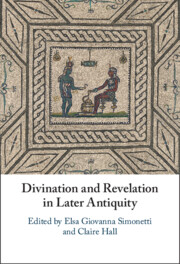Book contents
- Divination and Revelation in Later Antiquity
- Divination and Revelation in Later Antiquity
- Copyright page
- Contents
- Illustrations
- Notes on Contributors
- Acknowledgements
- Introduction
- Part I Philosophical Perspectives on Divination, Revelation, and Prophecy
- Chapter 1 Theories of Prophecy in Philo of Alexandria
- Chapter 2 The Neoplatonic Background of a Text on Prophecy Attributed to John Chrysostom
- Chapter 3 ‘Revelation’ for Christians and Pagans and Its Philosophical Allegoresis
- Chapter 4 Divination and Dialogue in Porphyry and Iamblichus
- Part II Status, Role, and Functions of Human Intermediaries
- Part III Divine Transcendence and Pragmatic Purposes
- Index
- References
Chapter 3 - ‘Revelation’ for Christians and Pagans and Its Philosophical Allegoresis
Intersections within Imperial Platonism
from Part I - Philosophical Perspectives on Divination, Revelation, and Prophecy
Published online by Cambridge University Press: 19 October 2023
- Divination and Revelation in Later Antiquity
- Divination and Revelation in Later Antiquity
- Copyright page
- Contents
- Illustrations
- Notes on Contributors
- Acknowledgements
- Introduction
- Part I Philosophical Perspectives on Divination, Revelation, and Prophecy
- Chapter 1 Theories of Prophecy in Philo of Alexandria
- Chapter 2 The Neoplatonic Background of a Text on Prophecy Attributed to John Chrysostom
- Chapter 3 ‘Revelation’ for Christians and Pagans and Its Philosophical Allegoresis
- Chapter 4 Divination and Dialogue in Porphyry and Iamblichus
- Part II Status, Role, and Functions of Human Intermediaries
- Part III Divine Transcendence and Pragmatic Purposes
- Index
- References
Summary
This chapter first investigates the meaning of ‘revelation’ in ancient Christianity and ancient non-Jewish and non-Christian religions, especially in ‘pagan’ Platonism of the early imperial period. ‘Revelation’ was characterised by the stress on authoritative sources of revealed knowledge (e.g., the Bible, the Chaldaean Oracles). The objective is to argue that ‘pagan’ Platonists faithful to Plato (and commenting just on Plato) cannot be simplistically opposed to Jewish or Christian Platonists faithful to the Bible (and commenting exclusively on the Bible). The chapter examines how philosophical allegoresis was applied by Stoics and Platonists – ‘pagan’, Jewish, and Christian Platonists – to their authoritative texts and revelations. This study provides an accurate examination of the conceptual and methodological intersections between the works of ‘pagan’ and Christian Platonists, and points to cases that break the binary between ‘pagan’ commentaries on ‘pagan’ authoritative texts and Christian commentaries on Scripture. It will also suggest that Amelius commented on the Prologue of John in light of his previous knowledge of Origen’s Commentary.
Keywords
- Type
- Chapter
- Information
- Divination and Revelation in Later Antiquity , pp. 49 - 72Publisher: Cambridge University PressPrint publication year: 2023

